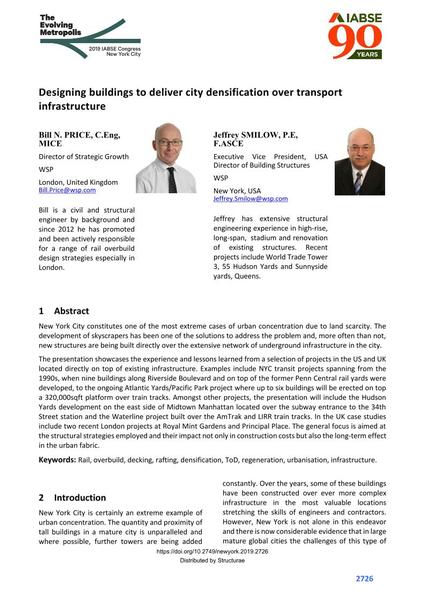Designing buildings to deliver city densification over transport infrastructure

|
|
|||||||||||
Détails bibliographiques
| Auteur(s): |
Bill N. Price
(WSP)
Jeffrey Smilow (WSP) |
||||
|---|---|---|---|---|---|
| Médium: | papier de conférence | ||||
| Langue(s): | anglais | ||||
| Conférence: | IABSE Congress: The Evolving Metropolis, New York, NY, USA, 4-6 September 2019 | ||||
| Publié dans: | The Evolving Metropolis | ||||
|
|||||
| Page(s): | 2726-2736 | ||||
| Nombre total de pages (du PDF): | 11 | ||||
| DOI: | 10.2749/newyork.2019.2726 | ||||
| Abstrait: |
New York City constitutes one of the most extreme cases of urban concentration due to land scarcity. The development of skyscrapers has been one of the solutions to address the problem and, more often than not, new structures are being built directly over the extensive network of underground infrastructure in the city. The presentation showcases the experience and lessons learned from a selection of projects in the US and UK located directly on top of existing infrastructure. Examples include NYC transit projects spanning from the 1990s, when nine buildings along Riverside Boulevard and on top of the former Penn Central rail yards were developed, to the ongoing Atlantic Yards/Pacific Park project where up to six buildings will be erected on top a 320,000sqft platform over train tracks. Amongst other projects, the presentation will include the Hudson Yards development on the east side of Midtown Manhattan located over the subway entrance to the 34th Street station and the Waterline project built over the AmTrak and LIRR train tracks. In the UK case studies include two recent London projects at Royal Mint Gardens and Principal Place. The general focus is aimed at the structural strategies employed and their impact not only in construction costs but also the long-term effect in the urban fabric. |
||||
